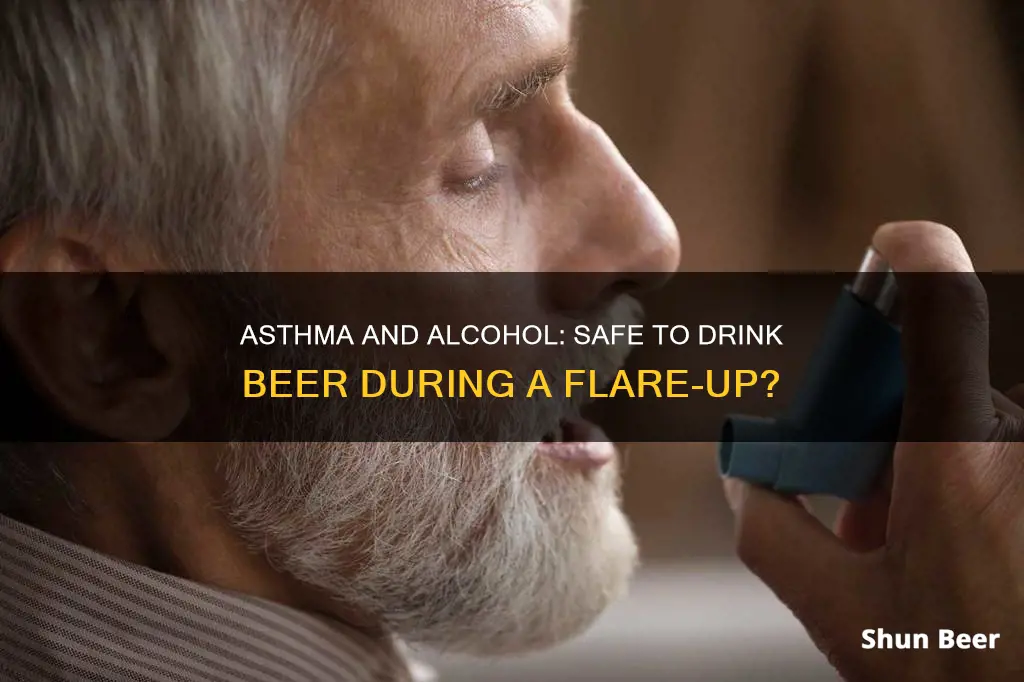
Alcohol is a known asthma trigger, with wine, beer, and cider being the most common culprits. This is due to their high levels of sulfites and histamines, which can cause allergic reactions in some people with asthma. However, there is limited scientific evidence on the link between alcohol and asthma, and not everyone with asthma experiences issues when consuming alcohol. Some people even claim that a small amount of alcohol can help alleviate their asthma symptoms. So, can you drink beer during an asthma flare-up? The answer is complex and depends on individual triggers and sensitivities. While some may find that beer worsens their symptoms, others may experience temporary relief.
| Characteristics | Values |
|---|---|
| Alcohol's effect on asthma | Alcohol can trigger asthma attacks in some people. |
| How does alcohol affect asthma? | Alcohol contains histamines and sulfites, which are known to trigger asthma attacks. |
| Which alcoholic drinks are most likely to trigger asthma? | Wine, beer, and cider are more likely to trigger asthma attacks due to their higher levels of histamines and sulfites. |
| How quickly does alcohol affect asthma? | Some people notice asthma symptoms after a few sips of alcohol, while others can have one or two drinks without problems. |
| Is it safe to drink alcohol while taking asthma medications? | The NHS says it is usually safe to drink alcohol while using a preventer and reliever inhaler. However, it is recommended to avoid drinking alcohol if you are taking steroid tablets as it can irritate your stomach. |
| How to lower the risk of asthma symptoms from alcohol | Choose alcoholic drinks wisely or avoid them altogether, especially if you know certain drinks trigger your asthma. |
What You'll Learn
- Beer contains histamines and sulfites, which can trigger asthma symptoms
- Wine is the most common alcoholic drink to trigger asthma symptoms
- Asthma sufferers should always carry a reliever inhaler
- Alcohol can worsen feelings of stress and negatively impact health
- Excessive alcohol use increases the risk of other medical problems

Beer contains histamines and sulfites, which can trigger asthma symptoms
Beer contains histamines and sulfites, two ingredients that can trigger asthma symptoms. Histamines are produced from bacteria and yeast when alcohol ferments, and they are especially prevalent in red wine. Histamines are known to cause problems for people with allergies, especially asthma.
Sulfites are preservatives that are commonly used in wine and beer production to stop bacteria growth. They can also be present in other consumables. People with asthma are often sensitive to the effects of sulfites. Up to 10% of people dealing with asthma are sensitive to these additives, and this sensitivity can cause a range of symptoms, including wheezing and asthma attacks.
According to a 2000 study, 33% of participants said that alcohol was associated with an asthmatic event at least twice. Wine, which contains both sulfites and histamines, was the main culprit in inducing symptoms. The study also found that red wine was the most common drink to induce asthma symptoms.
Beer and cider can also trigger symptoms for some people as they contain higher levels of sulfites and histamines. Clear spirits like gin and vodka contain lower levels of these substances but may not be safe for everyone with asthma.
If you have asthma and want to drink alcohol, it is important to choose your drinks wisely. If you know that certain alcoholic drinks trigger your asthma, try to avoid them and opt for drinks that do not affect your condition. You can also try non-alcoholic alternatives or low-sulfite wines, but keep in mind that even low-sulfite wines contain some sulfites.
Beer and Medication: Is it Safe to Drink with GL?
You may want to see also

Wine is the most common alcoholic drink to trigger asthma symptoms
While triggers for an asthma attack vary from person to person, alcoholic drinks may be a cause for some. There is little scientific evidence of a link between alcohol and asthma, except for a study published in 2000 in The Journal of Allergy and Clinical Immunology. The study, which surveyed over 350 adults in Australia, found that 33% of participants had experienced an asthma attack triggered by alcohol on at least two occasions.
Wine, specifically red wine, was found to be the most common alcoholic drink to trigger asthma symptoms. This is due to the presence of sulfites and histamines, which are produced naturally during the fermentation process and are also added as preservatives. Sulfites are known to trigger allergic reactions in people with asthma, and histamines are released in the body during allergic reactions.
Other alcoholic drinks, such as beer and cider, can also trigger asthma symptoms due to their sulfite and histamine content. Clear spirits like gin and vodka have lower levels of these substances but may still pose a risk to some individuals with asthma. It is important for people with asthma to be aware of their triggers and take steps to prevent an attack, such as avoiding certain drinks or choosing non-alcoholic alternatives.
Beer and ProctorU: What You Need to Know
You may want to see also

Asthma sufferers should always carry a reliever inhaler
While there is limited scientific evidence of a link between alcohol and asthma, some studies suggest that alcohol can trigger asthma symptoms or even a full-blown asthma attack. Histamines and sulfites, which are found in various types of alcohol, are known to cause allergic reactions in some people with asthma. Therefore, it is recommended that asthma sufferers avoid alcoholic drinks, particularly wine, which contains high levels of these substances.
Regardless of the trigger, asthma attacks can be life-threatening, and it is crucial for asthma sufferers to always carry a reliever inhaler to treat symptoms quickly. Reliever inhalers, also known as rescue inhalers, contain a medicine called a bronchodilator, which works to quickly open airways and help the person breathe more easily. It is important to note that reliever inhalers are not a substitute for preventive measures and regular medication. They should only be used occasionally when experiencing asthma symptoms or during an asthma attack.
It is recommended to consult a doctor if you are using your reliever inhaler frequently, as it could be a sign that your asthma is not well controlled. Additionally, it is advised to develop an asthma action plan with your healthcare provider to effectively manage your asthma and determine your triggers. This plan should be shared with friends and family so they can provide assistance during an asthma attack.
In conclusion, while the link between alcohol and asthma is not yet fully understood, it is important for asthma sufferers to be cautious and avoid known triggers. Furthermore, always carrying a reliever inhaler is crucial for managing asthma symptoms and preventing emergencies.
Beer Overdose: Vision Impact and Health Risks
You may want to see also

Alcohol can worsen feelings of stress and negatively impact health
While there is little scientific evidence of a link between alcohol and asthma, one study published in The Journal of Allergy and Clinical Immunology found that 33% of participants had experienced an asthma attack triggered by alcohol on at least two occasions. The study also found that wine was the most allergenic alcoholic beverage, with symptoms usually starting within an hour of drinking.
Secondly, alcohol can cause physiological stress on the body by disrupting its delicate hormonal balance. It causes the release of higher amounts of cortisol, which alters the brain's chemistry and changes the body's perception and response to stress. This disruption in hormonal balance can increase the risk of developing alcohol use disorders, as individuals may be compelled to consume greater amounts of alcohol over time to achieve the same effect.
Thirdly, excessive alcohol consumption can lead to long-term health problems, including mental health disorders. It can cause permanent brain damage, affect the heart, liver, pancreas, and immune system, and increase the risk of several types of cancer. Alcohol abuse can also harm relationships and society through violence, crime, accidents, and drink driving.
Finally, stress is a common trigger for asthma symptoms, and excessive alcohol consumption can worsen feelings of stress. Therefore, while alcohol may not directly trigger asthma attacks for everyone, it can indirectly contribute to asthma flare-ups by increasing stress levels.
Beer and Breastfeeding: Is It Safe?
You may want to see also

Excessive alcohol use increases the risk of other medical problems
Excessive alcohol consumption can increase the risk of several medical problems, including:
- Liver disease: Alcohol-associated liver disease (ALD) includes a range of conditions such as steatosis (fatty liver), steatohepatitis (inflammation), fibrosis, cirrhosis, hepatocellular carcinoma, and alcohol-associated hepatitis. ALD is a major contributor to alcohol-related morbidity and mortality.
- Pancreatitis: Alcohol is the leading cause of chronic pancreatitis and the second leading cause of acute pancreatitis. It can cause dangerous inflammation in the pancreas, leading to swelling, pain, and impaired function.
- Gastrointestinal issues: Alcohol can damage the mucous membranes lining the gastrointestinal tract, leading to inflammation, bleeding, and conditions such as gastroesophageal reflux disease (GERD).
- Immune system dysfunction: Alcohol can interfere with the body's immune response, increasing the risk of infections, impeding tissue recovery, causing inflammation, and contributing to organ damage.
- Cardiovascular problems: Heavy alcohol use is linked to heart disease and stroke. Even low levels of alcohol consumption are associated with an increased risk of hypertension, arrhythmias, heart attacks, and strokes.
- Neurological damage: Excessive alcohol use can lead to brain damage, cognitive deficits, and an increased risk of dementia. It can also cause peripheral neuropathy, resulting in sensory loss and pain in the extremities.
- Cancer: Alcohol is a carcinogen associated with cancers of the oral cavity, pharynx, larynx, esophagus, colon, rectum, liver, and breast. Even low levels of alcohol consumption increase the risk of breast cancer.
- Diabetes: Alcohol intake can interfere with blood glucose control in diabetic patients and increase the risk of developing Type 2 diabetes.
- Respiratory issues: Alcohol can impair lung function, increasing the risk of pneumonia, acute respiratory distress syndrome (ARDS), and other respiratory infections.
- Mental health issues: Excessive alcohol consumption is linked to an increased risk of mental health conditions such as depression, anxiety, and suicide.
- Other health issues: Excessive alcohol use can also lead to unhealthy weight gain, gout, osteoporosis, fractures, sexual dysfunction, and fertility issues.
Beer Ounces: Understanding Standard Drink Sizes
You may want to see also
Frequently asked questions
Beer contains histamines and sulfites, which are known triggers for asthma. Therefore, it is not recommended to drink beer during an asthma flare-up as it may worsen symptoms or trigger a full-blown asthma attack.
Drinking beer can cause a tight chest, breathlessness, or wheezing in people with asthma. Additionally, alcohol is dehydrating, and dehydration can cause mucus to thicken, making it harder to breathe.
Clear spirits such as gin and vodka contain lower levels of sulfites and histamines, but they may not be safe for everyone with asthma. It is important to note that individual triggers can vary, and even small amounts of alcohol may be enough to trigger symptoms.
Instead of beer, people with asthma can try low-sulfite wines, non-alcoholic drinks, or mocktails made with fresh ingredients. Caffeinated drinks, vitamin D-fortified milk, and water may also help reduce airway constriction. However, it is always a good idea to consult a doctor to determine the best treatment plan for managing asthma symptoms.







